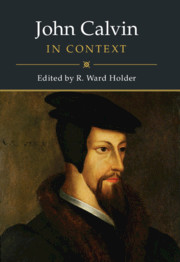Book contents
- John Calvin in Context
- John Calvin in Context
- Copyright page
- Dedication
- Contents
- Contributors
- Acknowledgments
- Abbreviations
- Introduction
- Part I France and Its Influence
- Part II Switzerland, Southern Germany, and Geneva
- 7 The Swiss Confederation in the Age of John Calvin
- 8 Strasbourg in the Sixteenth Century
- 9 Geneva and Its Protectors
- 10 Daily Life in Geneva
- 11 Reforming the City-State
- 12 Consistories and Discipline
- 13 Reformed Education and the Genevan Academy
- 14 Worship, Pastorate, and Diaconate in Early Modern Europe
- Part III Empire and Society
- Part IV The Religious Question
- Part V Calvin’s Influences
- Part VI Calvin’s Reception
- Conclusion
- Bibliography
- Index
- References
14 - Worship, Pastorate, and Diaconate in Early Modern Europe
from Part II - Switzerland, Southern Germany, and Geneva
Published online by Cambridge University Press: 14 November 2019
- John Calvin in Context
- John Calvin in Context
- Copyright page
- Dedication
- Contents
- Contributors
- Acknowledgments
- Abbreviations
- Introduction
- Part I France and Its Influence
- Part II Switzerland, Southern Germany, and Geneva
- 7 The Swiss Confederation in the Age of John Calvin
- 8 Strasbourg in the Sixteenth Century
- 9 Geneva and Its Protectors
- 10 Daily Life in Geneva
- 11 Reforming the City-State
- 12 Consistories and Discipline
- 13 Reformed Education and the Genevan Academy
- 14 Worship, Pastorate, and Diaconate in Early Modern Europe
- Part III Empire and Society
- Part IV The Religious Question
- Part V Calvin’s Influences
- Part VI Calvin’s Reception
- Conclusion
- Bibliography
- Index
- References
Summary
Religious life in late medieval Latin Christendom was intense. A turn toward pastoral theology and increasing lay literacy and activism led to criticism of and rising expectations for clergy (more preaching, better morals), multiplication of devotions (e.g., prayer books promising indulgences, elaborate church decoration, new saints’ shrines, and pilgrimages), and anxieties about means of salvation and good works (e.g., chantries and Mass foundations, practices of charity in face of the “undeserving poor”). Among the responses were reformulations of the understanding and practice of worship and the roles and characters of ministries.
- Type
- Chapter
- Information
- John Calvin in Context , pp. 119 - 128Publisher: Cambridge University PressPrint publication year: 2019

